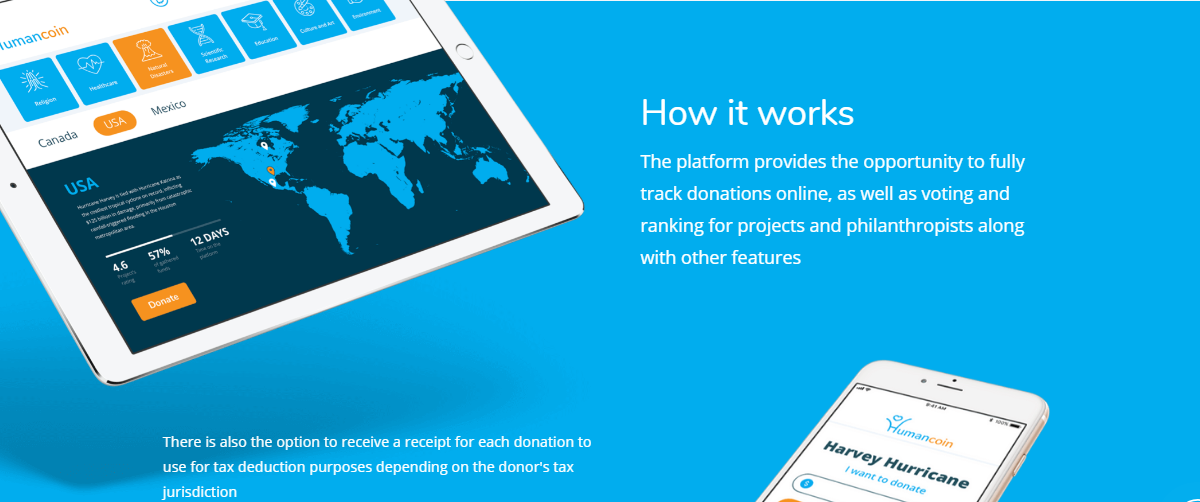Humancoin Review
Website : https://www.humancoin.net/
Problem
Despite the rise of new
mechanisms for donating, the charity industry still cannot overcome its main
obstacle — a lack of trust. Donors, most of whom are private individuals,
simply lack the means to verify whether their funds have reached the addressee
in full and in the required timeframe, even if they transfer the money with the
help of specialized organizations. According to various sources, about 20% (or
more) of all donated funds end up being kept as administrative expenses by
charity foundations.
Many are faced with the
complexity of cross-border payments (when one wants to help a foreign recipient)
and later, potential difficulties with regulatory bodies. In addition, donors
are forced to spend a part of their well-intentioned contribution on covering
the operational costs of the transaction.
Solution
The distributed ledger
technology, which is designed to put an end to the middleman, gets rid of the
long charity chain composed of banks, NGOs, state bodies and law firms.
Blockchain provides a digital mechanism for recording and viewing any
transaction. It is important that the record cannot be hacked or modified.
Blockchain solves the trust issue by providing transparency, traceability and
security.
Importantly, the new
technology facilitates the development of direct financing platforms on a much
larger scale. Philanthropists themselves can ultimately benefit from automated
smart contracts as the recipients of grants will only be able to use their
funds after meeting mandatory conditions.
All the many advantages
that blockchain delivers will spur the growth of the charity industry. This new
technology is already being studied by major market players such as UNICEF, the
World Bank and Bill & Melinda Gates Foundation. Over the past few years, a
number of respected charitable organizations such as the Red Cross, Save the
Children and United Way, among others, have already begun accepting donations
in cryptocurrencies.
The cryptocurrency market is undergoing a period of
rapid development; its capitalization fluctuates in the range of $0.3-0.8
trillion with a strong upward trend. An increasing number of individuals and
institutional investors are placing their money in these new financial instruments. In early April
2018, the head of the IMF Christine Lagarde said that cryptoassets could change
the consumer’s approach to savings, investments and settlements. She believes
that cryptocurrencies will make transactions faster and less expensive, while
the core blockchain technology has the potential to reinforce the overall
security of the financial markets.
The interest in cryptocurrencies in no longer the
preserve of a select few fintech specialists. Tokens that can demonstrate clear
and coherent benefits for their owners will almost certainly see rapid growth.
For example, Binancecoin broke into the list of the top 20 cryptocurrencies,
with a capitalization of over $1.5 billion, simply by offering its users a 50%
discount on Binance exchange fees, one of the most prominent cryptoexchanges.
Summary:
a possible synergy of markets
The global estimate of three fastgrowing markets —
charity, e-commerce and cryptocurrencies — exceeds $3.5 trillion. By ensuring
the necessary trust bet-ween donors and the aid recipients, blockchain
technology can propel this industry to incredible new heights.
The rise of a charitable blockchain platform
integrated into online commerce loyalty programs and cryptocurrencies will
change the philanthropy industry forever. The symbiosis of e-commerce and
cryptocurrencies will facilitate an increase in the number of donors. For those
involved in online commerce, offering a bonus affiliated with charity is an
effective way to position their brand on an emotional level with their clients,
as well as being an important element in any PR-campaign. And, finally, the
whole process is just very convenient for everyone involved.
The advantage of the blockchain solution is that the
benefits of working with the platform are evident. All the data generated from
the receipt and movement of the donations will be available to anyone who
wishes, for example, to donate money towards the development of a new cancer
drug, and to an airline that encourages such actions by awarding such a donor
with promotional miles.
Competitive
analysis
Virtually everyone recognizes the need to make the
philanthropic industry transparent and completely manageable with the help of
blockchain technology. However, there are relatively few blockchain projects in
the charity sphere: cherr.io, aidcoin, clearaid, bcharity among them. But these
are niche or local start-ups that do not operate beyond the philanthropic
industry. There are about the same number of blockchain projects developing
loyalty programs, but all of them face the problems of a making a cold start
and beginning with an insufficient user base in order to quickly and
productively build meaningful cooperation with major global e-commerce players.
In contrast, the Humancoin Foundation integrates the
charity industry, cryptocurrency market and e-commerce in a single project. An
ecosystem of this kind provides a new incentive for donors, offering them the
chance to take advantage of numerous loyalty programs around the world. While
e-commerce players often accept cryptocurrency, it is not necessary in order to
develop the Humancoin model.
For More Information :
Bitcointalk Profil : https://bitcointalk.org/index.php?action=profile;u=2275669;sa=summary




Komentar
Posting Komentar